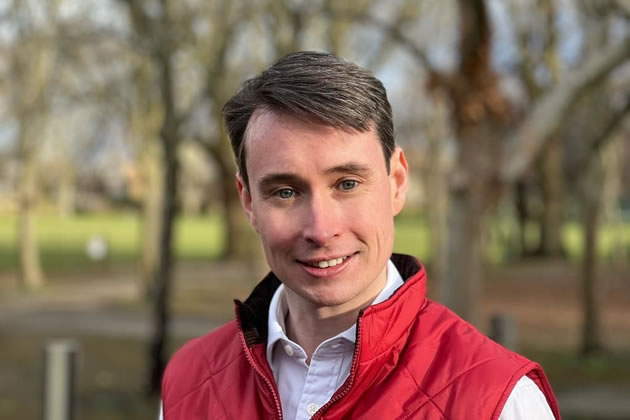Council Says AI Has Boosted Coffers By Over £1million
Technology has reduced fraud and waste and increased grant revenue

The use of AI is being led by Cllr Rowan Ree who also works in compliance at a Japanese bank. Picture: Rowan Ree
August 20, 2025
Hammersmith & Fulham Council says it has boosted its ability to fight fraud and secure essential government grants partly thanks to its use of AI.
The borough launched its Fraud, Recovery and Error Detection (FRED) programme, which uses data and AI, earlier this year.
The council said FRED has already identified more than £1 million in savings and new income for 2025/26.
Cllr Rowan Ree, Cabinet Member for Finance and Reform, said Hammersmith and Fulham is keen to push new technologies “as far as possible”, improving not only how it spends money “but also how we deliver services”.
As with other councils across the UK, Hammersmith & Fulham has had to find creative ways of operating in an increasingly tight fiscal environment.
It says that since 2010 it has had a 54 per cent reduction in funding from central Government in real terms.
Since 2014, when the Labour administration took the council, it has cut £138 million of ‘waste’ from its budgets while maintaining the third lowest council tax in England.
Its financial management was recently praised in a Finance Peer Challenge (FPC). Led by the Local Government Association (LGA), FPCs scrutinise council finances and provide a number of recommendations.
In the report, Hammersmith & Fulham Council was praised for its ability to hit savings targets and funding of “political priorities”, such as low council tax rates and community safety services.
Its leadership and the work done to collaborate with both private and public sector partners was also singled out, with the council’s Upstream London programme described as “an exemplar of strong political leadership”.
A recent addition to the council’s set of tools supporting its financial resilience is FRED. Using data and AI, FRED has identified more than £1m in savings and increased income for the current financial year.
In a recent opinion piece for the Municipal Journal (MJ) Cllr Ree gave several examples of ways in which FRED has successfully been deployed, one of which involves the Freedom Pass scheme.
Freedom Passes enable older people and those with disabilities to travel at no cost on most London public transport.
Cllr Ree wrote, “By using data from seven sources to flag passes for review, including council tax records, parking permit systems, and death records, we can detect fraud and cease passes, where necessary. This lowers our annual contribution to the Freedom Pass scheme. So far, we’ve identified more than 400 passes that can be closed.”
The use of data to identify fraud was also referenced, with 70 cases under investigation at the time for tenancy fraud.
“Since the start of April, we have recovered a two-bedroom property due to subletting, another due to a false application, and two properties due to fraudulent succession applications,” Cllr Ree wrote. “Returning these properties to local families in need on our waiting list is a huge win as we will spend less on pricey temporary accommodation.”
Speaking to the Local Democracy Reporting Service (LDRS), Cllr Ree said the public sector has been lagging behind the private world in its use of AI in particular.
Cllr Ree, who for his day job is Vice President of Compliance at the UK corporate and investment banking arm of a Japanese bank, said, “Councils are all very much stuck in this 1970s version of how you run public services, whereas if someone said your credit company has used AI and found a way to save £50 a month by cancelling this or that direct debit, everyone would think “oh that’s great”. If it’s in the public sector people become very squeamish about it.”
Put to Cllr Ree that some of that reticence is likely due to safety concerns in the use of AI, he said security is at the forefront of everything the local authority does.
“But we do have these tools now and everyone else in the private sector is using them,” he added. “It’s just once again the public sector is lagging behind and isn’t really rising to the challenge at the moment.”
Cllr Ree added Hammersmith and Fulham is “very keen” to push the use of such technology as far as it can, which he believes will have a huge impact on how it spends money “but also how we deliver services”.
“I think most people don’t want to spend their free time talking to the council. Whether that’s sitting on a phone waiting to be connected to somebody, whether it’s filling in forms on the internet that don’t work particularly well. Most people want any interaction with the council to be as quick as possible.”
Beyond its use in finding government grants and identifying savings, Cllr Ree said he wants to see AI become a key part of the council’s security apparatus.
Hammersmith & Fulham has one of the largest CCTV networks in the UK. The service has worked alongside Kensington and Chelsea Council for several years and last year launched a new partnership with Westminster.
Footage captured by the council’s CCTV network recently helped the Met Police make arrests after fireworks were let off by Hammersmith Bridge.
“Crime is the big issue that we’re tackling at the moment and we will use any tools that we can get our hands on to help with that,” Cllr Ree said. “That doesn’t only mean using AI in CCTV, it means boosting our CCTV presence even further. We’ve got the most comprehensive CCTV network in the country in terms of camera per resident, but we want to go further.”
Ben Lynch - Local Democracy Reporter